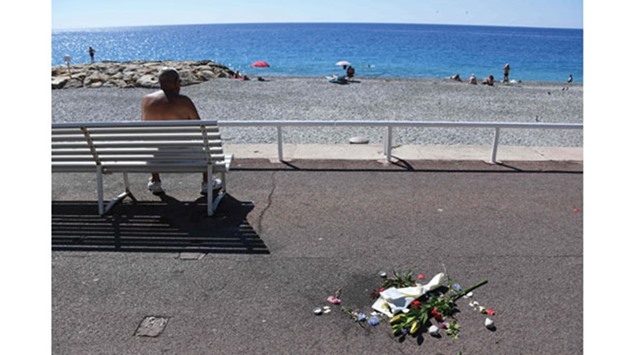The Nice truck attacker staked out the seafront for two days before striking, it emerged yesterday as investigators pieced together details of the IS-claimed massacre and questioned possible accomplices.
A source close to the investigation told AFP that Mohamed Lahouaiej-Bouhlel, a 31-year-old Tunisian, sent a text message just before the attack in which he “expresses satisfaction at having obtained a 7.65mm pistol and discusses the supply of other weapons”.
He also took a selfie at the wheel of the 19-tonne truck in the days before he ploughed it into a crowd of people who had been enjoying a fireworks display on Bastille Day, France’s national day, killing 84 and injuring about 300.
Mangled bodies were left strewn across the Riviera city’s seafront in the grisly attack by a man described by those who knew him as a loner with a history of violence and depression.
While some relatives and friends described the delivery driver as someone who drank heavily and never attended the local mosque, others questioned by investigators spoke of “a recent shift to radical Islam”, said a police source.
But there has been no evidence yet linking him to the Islamic State (IS) group, which on Saturday claimed the attack.
An Albanian suspected of providing the driver with the pistol was arrested in Nice yesterday.
Lahouaiej-Bouhlel fired at police who sprayed his rampaging truck with gunfire, eventually killing him.
Two replica assault rifles and a dummy grenade were also found in the truck, which he rented a few days earlier and used for reconnaissance on the seafront on the two consecutive days before the attack.
One of five other people being held over the carnage is a 22-year-old suspected of lending logistical support, said his lawyer Jean-Pascal Padovani.
The lawyer said the pair had only known each other for a few months.
Lahouaiej-Bouhlel’s estranged wife, the mother of his three children, was released yesterday after two days of questioning.
In Nice, many people were still desperately waiting for news of their loved ones.
Prosecutors said only 35 victims have been officially identified as they take painstaking measures to avoid errors of identification seen during the Paris attacks last November.
“We have no news, neither good nor bad,” said Johanna, a Lithuanian who was looking for her two friends, aged 20.
At least 10 children were among the dead as well as tourists from the United States, Ukraine, Switzerland, Germany and about 10 people from Russia, a local Russian association said.
Health Minister Marisol Touraine said 85 people were still hospitalised, 18 of them in critical condition.
Despite several brushes with the law for petty crime, Lahouaiej-Bouhlel had never appeared on the radar of intelligence services.
Interior Minister Bernard Cazeneuve said on Saturday he “seemed to have been radicalised very quickly, from what his friends and family” told police.
People who went to the same gym as Lahouaiej-Bouhlel – where he took dancing classes and lifted weights – described him as a vain man who “flirted with anything that moved”.
The Islamic State group said one of its “soldiers” carried out the attack in response to its calls to target countries from the US-led coalition engaged in airstrikes against the group.
Cazeneuve described the massacre as a “a new kind of attack”.
“We are now confronted with individuals open to IS’s message to engage in extremely violent actions without necessarily having been trained or having the weapons to carry out a mass (casualty) attack,” he said.
France’s third major attack in the past 18 months has left the government fending off criticism over security failures and scrambling to reassure citizens about their safety.
Cazeneuve called for volunteers to boost the security forces who were already on high alert under an eight-month-old state of emergency.
“I want to call on all French patriots who wish to do so, to join this operational reserve,” said Cazeneuve of a force currently made up of 12,000 volunteers aged between 17 and 30.
The latest attack comes after a French parliamentary inquiry last week criticised numerous failings by the intelligence services following jihadist assaults in January and November last year.
France is a prime target of IS, due to its role in fighting the group in Iraq and Syria, its emphasis on secular values, and what the government has admitted is a “social and ethnic apartheid” that alienates its large Muslim community.
Hundreds of French militants have gone to fight alongside IS in Iraq and Syria.
French Defence Minister Jean-Yves Le Drian noted that IS had recently repeated calls for supporters to “directly attack the French, Americans, wherever they are and by whatever means”.
“Even when Daesh is not the organiser, Daesh breathes life into the terrorist spirit that we are fighting,” he said, using an Arabic name for IS.

People enjoy the beach yesterday near flowers laid down as a tribute to victims of the deadly Bastille Day attack on the Promenade des Anglais in Nice.
